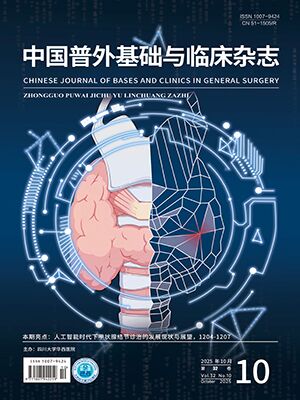Objective To compare the effects between laparoscopic and conventional open abdominal approaches on perineal wound healing for patients with rectal cancer.
Methods The clinical data of 54 patients undergoing laparoscopic abdominal perineal resection (laparoscopy group) and 48 patients undergoing open abdominal perineal resection (open group) between January 2008 and December 2009 in this hospital were collected. Parameters including class A healing rate of perineal wound, duration of surgery, duration of perineal resection, blood loss during operation, anterosacral drainage, and serum albumin level on day 3 after surgery were compared between two groups.
Results There was no significant difference of gender, age, tumor Dukes stage, preoperative albumin, or preoperative complications between two groups (P gt;0.05). The class A healing rate of perineal wound (χ2=5.54, P lt;0.05) and serum albumin level on the third day after surgery (t=3.92, P lt;0.01) in the laparoscopy group was significantly higher than those in the open group. In the laparoscopy group, duration of perineal resection (t=6.64, P lt;0.01), blood loss during operation (t=6.05, P lt;0.01), and anterosacral drainage (t=12.86, P lt;0.01) were less than those in the open group.
Conclusion The higher class A healing rate of laparoscopic approach for the patients with rectal cancer might be associated with the minimal invasiveness, less blood loss, and shorter duration.
Citation: QIAN Jun,ZHU Jie,MO Qi,TANG Liming.. Effect of Laparoscopic and Open Abdominal Miles Surgeries on Perineal Wound Healing for Postoperative Patients with Rectal Cancer. CHINESE JOURNAL OF BASES AND CLINICS IN GENERAL SURGERY, 2010, 17(10): 1017-1020. doi: Copy
Copyright © the editorial department of CHINESE JOURNAL OF BASES AND CLINICS IN GENERAL SURGERY of West China Medical Publisher. All rights reserved




